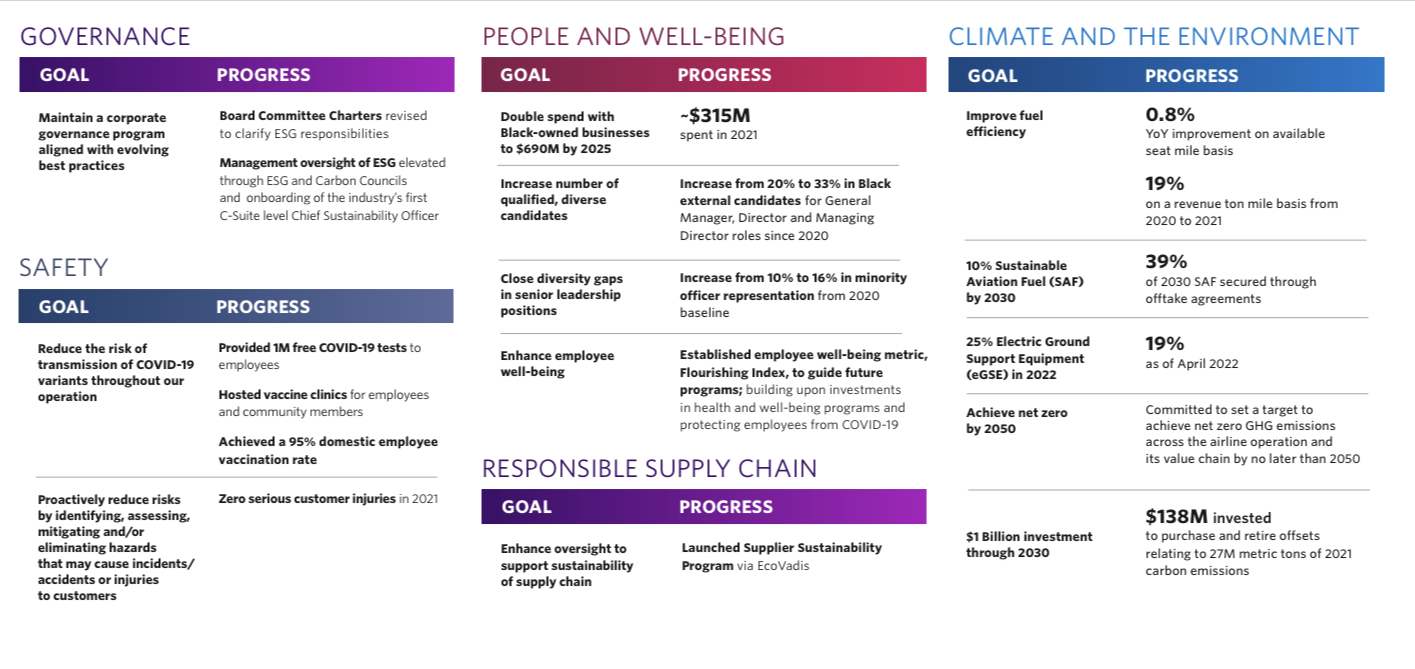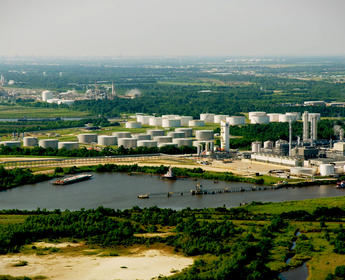Delta is delivering on its purpose to connect people to opportunity while expanding understanding of our planet and those within it, an ongoing journey detailed in its 2021 ESG Report.
“In a year full of opportunities, challenges and uncertainty, connection remained core to our business,” said Ed Bastian, Delta’s CEO. “Delta people were steadfast in delivering on our values as we made significant progress toward our ESG goals throughout the year. Our momentum and drive to connect the world will only increase in the months ahead as we welcome back more travelers to the skies.”
The report provides a holistic picture of Delta’s progress on the company’s ESG goals and initiatives.
PRIORITIZING SAFETY & CARE ABOVE ALL ELSE
Nothing is more important to Delta than the health and safety of its people and customers. Delta safely transported more than 135 million customers in 2021 and was named the Top U.S. Airline of 2021 by the Wall Street Journal in its annual airline scorecard rankings, as well as received Cirium’s Platinum Award for Operational Excellence, among other accolades. The recognition of Delta’s best-in-class reliability was driven by the unwavering commitment of its frontline people, including flight attendants, pilots, airport customer service agents, aircraft maintenance and technical specialists and many others.
Since the onset of the COVID-19 pandemic, Delta has transformed the industry health standard with new cleanliness practices for customers and employees. Central to advancing these efforts has been the leadership of Dr. Henry Ting, S.V.P. and Chief Health Officer, who joined Delta in early 2021.
With his leadership, Delta has continued to enhance its employee health and well-being programs, including through the creation of the Global Health and Wellbeing (GHW) Division, a first in the airline industry. This included efforts to advocate for and communicate the importance of COVID-19 vaccinations, which resulted in a 95% domestic employee vaccination rate at the end of 2021.
Its efforts throughout the pandemic were recognized by J.D. Power, which named Delta the No. 1 airline in the North America Airline Satisfaction Study, among other awards. Delta made a special profit-sharing payment of more than $100 million to its people to celebrate a profitable second half of 2021 and recognize their critical contributions to its success.
REFLECTING THE WORLD AND CREATING EQUITABLE OPPORTUNITY
In order to make progress toward a more equitable world, Delta is championing equity both within the company and in the communities where its employees and customers live, work and serve. In 2021, Delta made progress toward the goals set forth in its 2020 racial equity action plan.
“We made bold commitments in 2020 that were rooted in driving change inside and outside our business,” said Keyra Lynn Johnson, Delta’s Vice President and Chief Diversity, Equity & Inclusion Officer. “To accelerate real progress, we are building a culture that pursues equity, seeks diversity and promotes inclusion.”
In 2021, 94% of Delta’s non-executive job openings that were filled by external hires did not require a college degree. This followed the airline’s work to remove unnecessary barriers, like four-year-degree requirements, to certain roles as part of the company’s commitment to become an anti-racist, anti-discrimination organization. Delta also launched a new enhanced inclusion training experience in 2021 and more than 62,000 employees completed at least one of four DEI trainings. Notably, the company has also established a frontline mobility strategy, aimed at sourcing at least 25% of its professional-level positions from diverse frontline talent.
Delta’s Close the Gap strategy focuses on expanding representation and opportunity for diverse talent. Officer representation among underrepresented racial and ethnic groups increased to 16% in 2021 from 10% in 2020. It also increased representation of Black external candidates for general manager, director and managing director roles from 20% in 2020 to 33% in 2021. Delta will continue to prioritize this work along with its goal of doubling the number of Black officers and director-level employees by 2025. Delta continues to work toward increasing Black talent at the officer level where representation has not grown at the same pace.
Beyond its talent strategies, Delta advanced economic opportunities for underrepresented groups by spending nearly $315 million with Black-owned businesses in 2021, which advanced its goal of spending $690 million with Black-owned businesses by 2025. The expansion of its Supplier Diversity & Inclusion program illustrates the company’s commitment to creating opportunity for people to thrive while advancing shared values. Follow Delta's Diversity, Equity & Inclusion news here.
CONNECTING AMBITION WITH ACTION FOR A SUSTAINABLE FUTURE
Guided by the belief that customers shouldn’t have to choose between seeing and saving the world, Delta announced in 2021 its intention to set new emissions targets for its global airline operations in line with the climate science underpinning the Paris Agreement.
Delta has taken significant actions in 2021 to progress its climate goals in the short and long term. To help advance the work already underway, Pam Fletcher joined the company in February 2022 as its Chief Sustainability Officer. “Our work today is to disrupt, challenge and champion the technologies that will define the future of sustainable flight,” she said.
In 2021, Delta took delivery of 52 next-gen aircraft that were, on average, 25% more fuel efficient per seat mile than retired aircraft, contributing to a fleet-wide fuel efficiency improvement of almost 1% compared to 2020. This resulted in overall fuel savings of 22.5M gallons resulting from a combination of fleet renewal, operational initiatives, and other factors like changing flight paths to reduce fuel burn and supporting efforts to modernize air traffic management.
By 2030, Delta aims to procure more than 400 million gallons of SAF annually to meet our 10% goal, which is almost 40 times the total global SAF production in 2019. It had secured almost 40% of that goal through offtake agreements, subject to timely third-party investment and facility development. SAF will play a key role in aviation’s decarbonization pathway as it can reduce lifecycle greenhouse gas emissions up to 80% compared to fossil jet fuels.
The journey to a better future will rely on partnership, collaboration and innovation among Delta and all of its stakeholders.
“We know we can’t do this alone,” Bastian said. “That’s why we’re joining with our employees, our customers, our business partners and our communities on this journey toward a bright future together.”
Read the full ESG report, and for more information and future updates, sign up for Delta News Hub email alerts.
FORWARD LOOKING STATEMENTS
The statements in this release that are not historical facts, including statements regarding our estimates, expectations, beliefs, intentions, projections, goals, aspirations, commitments or strategies for the future, should be considered “forward-looking statements” under the Securities Act of 1933, as amended, the Securities Exchange Act of 1934, as amended, and the Private Securities Litigation Reform Act of 1995 and any other available safe harbors under the federal securities laws. All forward-looking statements involve a number of risks and uncertainties, as described below, that could cause actual results to differ materially from the estimates, expectations, beliefs, intentions, projections, goals, aspirations, commitments and strategies reflected in or suggested by the forward-looking statements.
These risks and uncertainties include, but are not limited to, the material adverse effect that the COVID-19 pandemic has had on our business; the impact of incurring significant debt in response to the pandemic; failure to comply with the financial and other covenants in our financing agreements; the possible effects of accidents involving our aircraft or aircraft of our airline partners; breaches or lapses in the security of technology systems on which we rely; disruptions in our information technology infrastructure; our dependence on technology in our operations; our commercial relationships with airlines in other parts of the world and the investments we have in certain of those airlines; the effects of a significant disruption in the operations or performance of third parties on which we rely; failure to realize the full value of intangible or long-lived assets; labor issues; the effects of weather, natural disasters and seasonality on our business; the cost of aircraft fuel; the availability of aircraft fuel; failure or inability of insurance to cover a significant liability at Monroe’s Trainer refinery; failure to comply with existing and future environmental regulations to which Monroe’s refinery operations are subject, including costs related to compliance with renewable fuel standard regulations; our ability to retain senior management and other key employees, and to maintain our company culture; significant damage to our reputation and brand, including from exposure to significant adverse publicity and failure to make progress toward and achieve our environmental sustainability and diversity, equity and inclusion goals; the effects of terrorist attacks, geopolitical conflict or security events; competitive conditions in the airline industry; extended interruptions or disruptions in service at major airports at which we operate or significant problems associated with types of aircraft or engines we operate; the effects of extensive government regulation we are subject to; the impact of environmental regulation, including increased regulation to reduce emissions and other risks associated with climate change, on our business; and unfavorable economic or political conditions in the markets in which we operate or volatility in currency exchange rates.
Additional information concerning risks and uncertainties that could cause differences between actual results and forward-looking statements is contained in our Securities and Exchange Commission filings, including our Annual Report on Form 10-K for the fiscal year ended December 31, 2021. Caution should be taken not to place undue reliance on our forward-looking statements, which represent our views only as of May 5, 2022, and which we have no intention to update except to the extent required by law.







